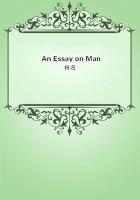"Is that a humbug, too? Is it a fact--or have I dreamt it--that, by means of electricity, the world of matter has become a great nerve, vibrating thousands of miles in a breathless point of time? Rather, the round globe is a vast head, a brain, instinct with intelligence!
Or, shall we say, it is itself a thought, nothing but thought, and no longer the substance which we deemed it!""If you mean the telegraph," said the old gentleman, glancing his eye toward its wire, alongside the rail-track, "it is an excellent thing,--that is, of course, if the speculators in cotton and politics don't get possession of it. A great thing, indeed, sir, particularly as regards the detection of bank-robbers and murderers.""I don't quite like it, in that point of view," replied Clifford.
"A bank-robber, and what you call a murderer, likewise, has his rights, which men of enlightened humanity and conscience should regard in so much the more liberal spirit, because the bulk of society is prone to controvert their existence. An almost spiritual medium, like the electric telegraph, should be consecrated to high, deep, joyful, and holy missions. Lovers, day by, day--hour by hour, if so often moved to do it,--might send their heart-throbs from Maine to Florida, with some such words as these `I love you forever!'
--`My heart runs over with love!'--`I love you more than I can!' and, again, at the next message 'I have lived an hour longer, and love you twice as much!' Or, when a good man has departed, his distant friend should be conscious of an electric thrill, as from the world of happy spirits, telling him 'Your dear friend is in bliss!' Or, to an absent husband, should come tidings thus `An immortal being, of whom you are the father, has this moment come from God!' and immediately its little voice would seem to have reached so far, and to be echoing in his heart. But for these poor rogues, the bank-robbers,--who, after all, are about as honest as nine people in ten, except that they disregard certain formalities, and prefer to transact business at midnight rather than 'Change-hours, --and for these murderers, as you phrase it, who are often excusable in the motives of their deed, and deserve to be ranked among public benefactors, if we consider only its result,--for unfortunate individuals like these, I really cannot applaud the enlistment of an immaterial and miraculous power in the universal world-hunt at their heels!""You can't, hey?" cried the old gentleman, with a hard look.
"Positively, no!" answered Clifford. "It puts them too miserably at disadvantage. For example, sir, in a dark, low, cross-beamed, panelled room of an old house, let us suppose a dead man, sitting in an arm-chair, with a blood-stain on his shirt-bosom, --and let us add to our hypothesis another man, issuing from the house, which he feels to be over-filled with the dead man's presence,--and let us lastly imagine him fleeing, Heaven knows whither, at the speed of a hurricane, by railroad! Now, sir, if the fugutive alight in some distant town, and find all the people babbling about that self-same dead man, whom he has fled so far to avoid the sight and thought of, will you not allow that his natural rights have been infringed? He has been deprived of his city of refuge, and, in my humble opinion, has suffered infinite wrong!""You are a strange man; sir" said the old gentleman, bringing his gimlet-eye to a point on Clifford, as if determined to bore right into him. "I can't see through you!""No, I'll be bound you can't!" cried Clifford, laughing. "And yet, my dear sir, I am as transparent as the water of Maule's well!
But come, Hepzibah! We have flown far enough for once. Let us alight, as the birds do, and perch ourselves on the nearest twig, and consult wither we shall fly next!"Just then, as it happened, the train reached a solitary way-station.
Taking advantage of the brief pause, Clifford left the car, and drew Hepzibah along with him. A moment afterwards, the train--with all the life of its interior, amid which Clifford had made himself so conspicuous an object--was gliding away in the distance, and rapidly lessening to a point which, in another moment, vanished.
The world had fled away from these two wanderers. They gazed drearily about them. At a little distance stood a wooden church, black with age, and in a dismal state of ruin and decay, with broken windows, a great rift through the main body of the edifice, and a rafter dangling from the top of the square tower. Farther off was a farm-house, in the old style, as venerably black as the church, with a roof sloping downward from the three-story peak, to within a man's height of the ground. It seemed uninhabited. There were the relics of a wood-pile, indeed, near the door, but with grass sprouting up among the chips and scattered logs. The small rain-drops came down aslant; the wind was not turbulent, but sullen, and full of chilly moisture.
Clifford shivered from head to foot. The wild effervescence of his mood--which had so readily supplied thoughts, fantasies, and a strange aptitude of words, and impelled him to talk from the mere necessity of giving vent to this bubbling-up gush of ideas had entirely subsided. A powerful excitement had given him energy and vivacity. Its operation over, he forthwith began to sink.
"You must take the lead now, Hepzibah!" murmured he, with a torpid and reluctant utterance. "Do with me as you will!"She knelt down upon the platform where they were standing and lifted her clasped hands to the sky. The dull, gray weight of clouds made it invisible; but it was no hour for disbelief,--no juncture this to question that there was a sky above, and an Almighty Father looking from it!
"O God!"--ejaculated poor, gaunt Hepzibah,--then paused a moment, to consider what her prayer should be,--"O God,--our Father, --are we not thy children? Have mercy on us!"















